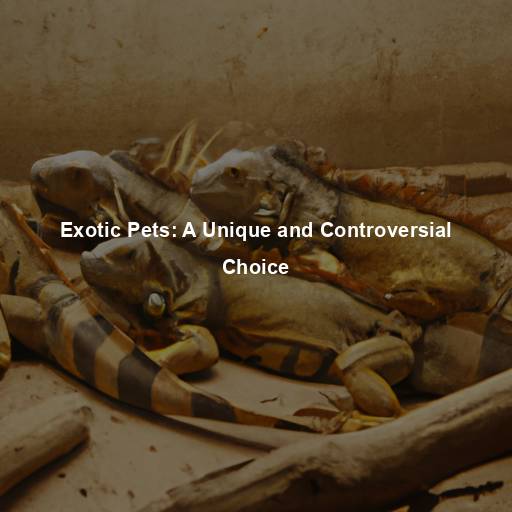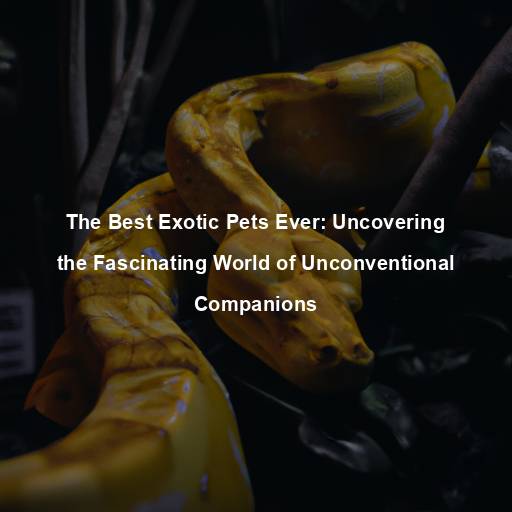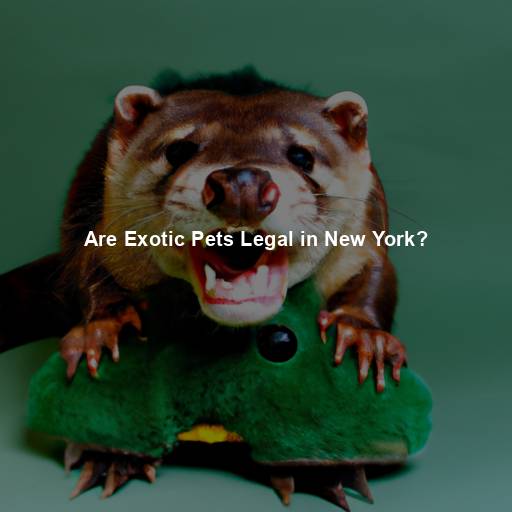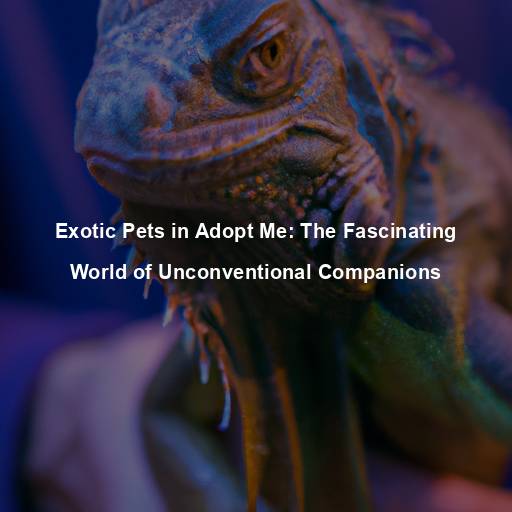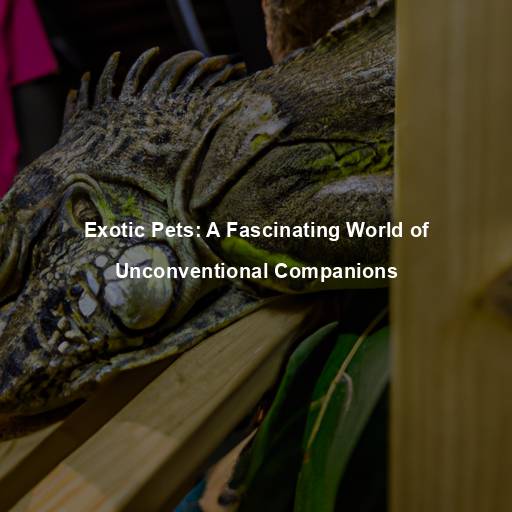Are Exotic Pets Legal in the US?
Last Updated on November 9, 2023 by Evan
Contents
- 1 The Importance of Responsible Legislation
- 2 The Future of Exotic Pet Ownership
- 3 FAQs: Are Exotic Pets Legal in the US?
- 3.1 Can I legally own an exotic pet in the United States?
- 3.2 Which exotic pets are commonly allowed in the US?
- 3.3 Are there any federal laws governing exotic pet ownership in the US?
- 3.4 What are the potential risks and concerns associated with owning exotic pets?
- 3.5 How can I find out the specific laws and regulations regarding exotic pet ownership in my state?
- 3.6 What should I do if I find out that owning an exotic pet is not legal in my state?
of Invasive Species
The release or escape of exotic pets into the wild can have devastating consequences for local ecosystems. Invasive species, which are non-native organisms that establish and spread rapidly, can outcompete native species, disrupt ecological balance, and cause significant environmental damage. It is crucial for exotic pet owners to prevent the accidental release of their pets and to never release them intentionally into the wild.
Animal Welfare Concerns
Exotic animals have specific physiological and behavioral needs that may be challenging to meet in a domestic setting. Some species require large enclosures, specialized diets, and complex environmental enrichment. It is essential for exotic pet owners to invest the time, resources, and knowledge necessary to provide proper care for their pets. Additionally, the trade and ownership of certain exotic species may involve unethical practices, such as capturing animals from the wild or supporting exploitative breeding facilities.
The Role of Accredited Zoos and Sanctuaries
Explore the captivating world of accredited zoos and sanctuaries, where the well-being and preservation of exotic animals take precedence. These remarkable institutions weave a tapestry of animal welfare, educational endeavors, and groundbreaking research, all while championing vital conservation programs and pioneering breeding initiatives. For those whose hearts yearn for the awe-inspiring beauty of exotic creatures but lack the means to provide the intricate care and resources required, supporting these accredited havens becomes a profound and purposeful path to contribute to the noble cause of wildlife conservation.
The Importance of Responsible Legislation
The Need for Standardized Regulations
In a world where tigers roam backyards and monkeys swing from chandeliers, the question of exotic pet ownership is more perplexing than ever. The hodgepodge of regulations swirling around this issue leaves both animals and humans in a state of uncertainty. To bring order to this chaotic menagerie, it is imperative that federal regulations be implemented to establish a standard for the care and safety of these extraordinary creatures. By bridging the gap between states, we can ensure the well-being of these enigmatic animals while protecting the public from the perplexities that currently plague the realm of exotic pet ownership.
Balancing Conservation and Animal Welfare
In a world teeming with diverse ecosystems and fascinating creatures, the task of crafting legislation that satisfies all concerns can often feel like traversing an elaborate maze. Navigating the delicate tightrope between preserving biodiversity and ensuring the welfare of our animal friends is no simple feat. Yet, it is essential that our lawmakers, armed with a comprehensive understanding of each species’ conservation status, evaluate the potential perils posed by their ownership. Only then can they strike an equilibrium where the responsible guardians of exotic pets can exist harmoniously alongside the fragile tapestry of nature.
Encouraging Licensing and Permits
One approach to regulating exotic pet ownership is through licensing and permits. These mechanisms can help ensure that prospective owners have the necessary knowledge, resources, and facilities to provide proper care for exotic animals. Licensing can also help authorities track the ownership and movement of exotic pets, making it easier to enforce regulations and prevent illegal trade.
Collaboration between Government Agencies and Animal Welfare Organizations
The harmonious merging of government agencies and animal welfare organizations is an absolute must if we are to create legislation and enforcement strategies that truly make a difference. United in purpose, these groups bring to the table a wealth of insight, resources, and differing viewpoints that can culminate in comprehensive regulations that honor both the well-being of animals and the imperative to conserve. Furthermore, joining forces with esteemed zoos, sanctuaries, and conservation organizations can serve as an additional catalyst in fostering responsible ownership of exotic pets. The collaborative possibilities are as mesmerizing as they are perplexing, setting the stage for a profoundly transformative future.
The Future of Exotic Pet Ownership
As society continues to evolve, the future of exotic pet ownership is likely to face ongoing discussions, debates, and potential changes. It is essential for all stakeholders, including lawmakers, animal welfare organizations, conservationists, and responsible pet owners, to engage in open and constructive dialogue to ensure the well-being of exotic animals and the preservation of their natural habitats.
In a world bursting with diverse perspectives and perplexing challenges, it is imperative that we join forces to navigate the complex realm of exotic pet ownership. By fostering a culture of education, advocating for responsible legislation, and embracing collaboration, we can pave a path towards an ethical future. This future, shimmering with potential, is one where the harmonious coexistence of humans and exotic pets thrives on a foundation of conservation efforts and the unwavering commitment to their welfare. Let us embark on this transformative journey, acknowledging that our love for these remarkable creatures must intertwine seamlessly with our unwavering dedication to preserving their natural habitats.
FAQs: Are Exotic Pets Legal in the US?
Can I legally own an exotic pet in the United States?
Navigating the intricate web of exotic pet ownership in the United States can feel akin to embarking on a bewildering treasure hunt. The rules, or lack thereof, zigzag across state lines, leaving prospective owners in a state of tantalizing uncertainty. From states that embrace the allure of exotic creatures to those that slam the door shut on such aspirations, it’s imperative to embark on an arduous journey of research to decipher the mysterious regulations that govern these captivating companions before even entertaining the thought of welcoming one into your sanctuary.
Which exotic pets are commonly allowed in the US?
In the vast realm of pet possibilities, there exists a world of enchanting creatures that can find their way into our hearts – and our homes. From the slithering elegance of geckos and ball pythons to the captivating grace of small, harmless snakes, the list of permissible exotic pets in the United States is as intriguing as it is perplexing. Don’t forget the mischievous charm of ferrets, the endearing quirkiness of hedgehogs, and the ethereal allure of sugar gliders. Even certain avian species and the mesmerizing beauty of exotic fish have found a place in this magnificent tapestry of pet ownership. But tread lightly, for amidst this menagerie lies the specter of local regulations and permit requirements, a labyrinth of restrictions waiting to bewilder the daring souls who seek to welcome these creatures into their lives.
Are there any federal laws governing exotic pet ownership in the US?
No comprehensive federal law exists specifically regulating exotic pet ownership in the United States. The responsibility for enacting and enforcing laws regarding the ownership of exotic animals primarily lies with individual states. However, there are federal laws, such as the Endangered Species Act, which strictly regulate the possession and trade of certain protected species, including some exotic animals. Additionally, federal agencies like the U.S. Fish and Wildlife Service may have specific permits and requirements for certain exotic animal ownership.
What are the potential risks and concerns associated with owning exotic pets?
Keeping exotic animals as pets can bring about a myriad of uncertainties and perplexities. Beyond the allure of having a unique companion, these animals often pose hidden dangers. They can harbor diseases that pose risks to humans, and their unconventional needs may prove bewildering and demanding to cater for, both financially and regarding research. Moreover, the potential for these creatures to escape and wreak havoc on local ecosystems should not be undermined. Therefore, it is essential to grasp the full magnitude of responsibilities and potential hazards before choosing to welcome an exotic pet into your home.
How can I find out the specific laws and regulations regarding exotic pet ownership in my state?
To find out the specific laws and regulations regarding exotic pet ownership in your state, it is advisable to contact or visit the relevant government agencies responsible for overseeing wildlife or animal control. This could be the state’s Department of Agriculture, Department of Natural Resources, or the Fish and Wildlife Service. They will be able to provide you with accurate and up-to-date information about the legality of owning exotic pets in your area, whether any permits are required, and any other relevant regulations you should be aware of.
What should I do if I find out that owning an exotic pet is not legal in my state?
Discovering that owning an exotic pet is prohibited in your state can be quite perplexing and unexpected. It is crucial to respect and abide by the local regulations to avoid any unwanted consequences. Rather than attempting to acquire or keep an illegal exotic pet, you can explore alternative ways to satisfy your fascination with these animals, such as getting involved in volunteering activities at a local zoo or wildlife sanctuary. This way, you can still indulge in the presence of exotic creatures while staying within the boundaries of the law.


